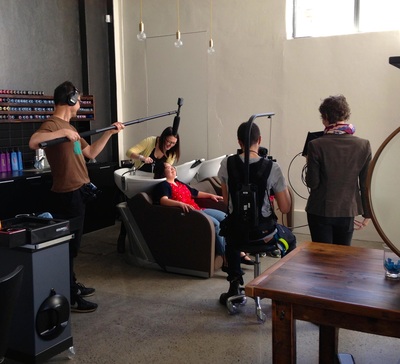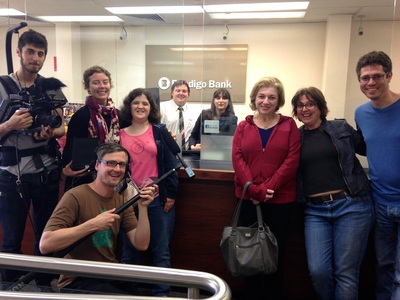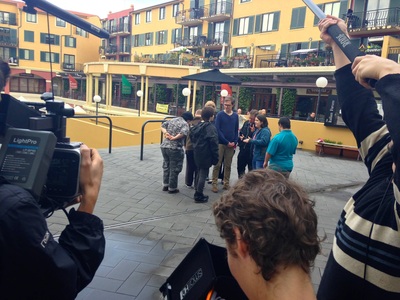About 'Supporting Inclusion'
'Supporting Inclusion' is an online learning program which has been developed with you, the support worker, in mind. It can also be used by trainers or teachers to support their teaching. The purpose of this program is to create a space where disability support workers can think about what social inclusion means for people with intellectual disability, and learn or refresh some useful tools and strategies to support people with intellectual disability in ways that will promote their social inclusion.
'Supporting Inclusion' is an online learning program which has been developed with you, the support worker, in mind. It can also be used by trainers or teachers to support their teaching. The purpose of this program is to create a space where disability support workers can think about what social inclusion means for people with intellectual disability, and learn or refresh some useful tools and strategies to support people with intellectual disability in ways that will promote their social inclusion.
The program is based on the principles of person centred active support, and is focused primarily on how this framework can be applied not just within supported accommodation services, but also out in the community.
The contents of this interactive online training program are the result of many years of research both in Australia and overseas. A substantial body of research evidence clearly shows that people with intellectual disability experience extreme forms of social exclusion. At the same time, our recent study on encounters between people with and without intellectual disability, also shows that disability support workers can play a crucial role in facilitating opportunities for people with intellectual disability to be more socially included.
The contents of this interactive online training program are the result of many years of research both in Australia and overseas. A substantial body of research evidence clearly shows that people with intellectual disability experience extreme forms of social exclusion. At the same time, our recent study on encounters between people with and without intellectual disability, also shows that disability support workers can play a crucial role in facilitating opportunities for people with intellectual disability to be more socially included.
How to Use this Online Learning Resource
You can access the online training program from any computer or tablet with internet access. If you prefer to work on a 'hard copy' or offline, you can also download the Workbook (in the resources section) and print it or save it to your computer. The Workbook contains all the material in the online program, except for the videos which must be viewed online.
The program is made of 8 modules and completing each of these modules should take no longer than 30 minutes, except for Module 2 which includes an activity that can take about two hours to complete. We encourage you to work through each of the 8 modules in order. You can do the training alone or as a group at your workplace in a team meeting for example. Each module includes short videos introducing key concepts and examples of support workers supporting service users out in the community. You can turn on English subtitles for each of the videos by clicking the "CC" button at the bottom of the video and choosing the "English CC" option.
Each module includes activities and questions that can be completed using the Workbook or the Activities Questions Booklet (both available for download in the resources section). The Activities Questions Booklet is a much shorter version of the Workbook, with just the activity questions. You can discuss your answers with supervisors and colleagues in team meetings.
The Supporting Inclusion can also be used as part of the formal training necessary towards the CHC43115 Certificate IV in Disability that is nationally recognised as part of the CHC Community Services Training Package. The program was mapped against the requirements of CHCDIS008 Facilitate Community Participation and Social Inclusion core Unit of Competency. Completing the online Supporting Inclusion resource fulfils some but not all of the requirements in this Unit of Competency. For further detail download the 'Program mapping' document in the resources section.
You can access the online training program from any computer or tablet with internet access. If you prefer to work on a 'hard copy' or offline, you can also download the Workbook (in the resources section) and print it or save it to your computer. The Workbook contains all the material in the online program, except for the videos which must be viewed online.
The program is made of 8 modules and completing each of these modules should take no longer than 30 minutes, except for Module 2 which includes an activity that can take about two hours to complete. We encourage you to work through each of the 8 modules in order. You can do the training alone or as a group at your workplace in a team meeting for example. Each module includes short videos introducing key concepts and examples of support workers supporting service users out in the community. You can turn on English subtitles for each of the videos by clicking the "CC" button at the bottom of the video and choosing the "English CC" option.
Each module includes activities and questions that can be completed using the Workbook or the Activities Questions Booklet (both available for download in the resources section). The Activities Questions Booklet is a much shorter version of the Workbook, with just the activity questions. You can discuss your answers with supervisors and colleagues in team meetings.
The Supporting Inclusion can also be used as part of the formal training necessary towards the CHC43115 Certificate IV in Disability that is nationally recognised as part of the CHC Community Services Training Package. The program was mapped against the requirements of CHCDIS008 Facilitate Community Participation and Social Inclusion core Unit of Competency. Completing the online Supporting Inclusion resource fulfils some but not all of the requirements in this Unit of Competency. For further detail download the 'Program mapping' document in the resources section.
How this training program was produced
Many of the videos in this training program were produced in collaboration with the Ever After Theater Group that includes actors both with and without intellectual disability. These videos involve Ever After actors role-playing encounters between a person with intellectual disability, a support worker and a stranger or a friend. Although there was some improvisation by the actors, these scenes are not fictional. They are based on encounters that really did happen and were observed and recorded by researchers. These videos were produced in order to illustrate typical situations and in particular some of the things support workers do that can contribute to, or in some cases undermine, social inclusion for participants.
Many of the videos in this training program were produced in collaboration with the Ever After Theater Group that includes actors both with and without intellectual disability. These videos involve Ever After actors role-playing encounters between a person with intellectual disability, a support worker and a stranger or a friend. Although there was some improvisation by the actors, these scenes are not fictional. They are based on encounters that really did happen and were observed and recorded by researchers. These videos were produced in order to illustrate typical situations and in particular some of the things support workers do that can contribute to, or in some cases undermine, social inclusion for participants.
Funding and Credits
The online learning resource was funded by the Australian Research Council's (ARC) Linkage Scheme. It is a collaboration between La Trobe University, the University of New South Wales, Kent University, Yooralla and Jewish Care (Victoria).
We would like to acknowledge the hard work and dedication of many people who have contributed to the development of this training program, as listed below.
Research and development: Christine Bigby and Ilan Wiesel
Producer (Maitree House): Peta Khan
Producer (Ever After Theatre Group): Alyson Evans
Directors: Peta Khan and Caroline Downs
Videos editor: Leigh Bramall
Reference group: Jacqueline Ryan, Stephen Thomas, Natarla Reid, Gaye Sheppard
Actors: Celeste Emslie, Gerard O'Dwyer, Natasha Edwards, Alexander Richardson, Emily Dash, Kerrie Anne Bezzina, Emma Plant, Tom Hancock, Roddy Salinas, Kyle Walmsley, Jackie Loeb, Maggie Scott, Caroline Thompson, Lauren Fawcett, Alyson Evans, Paul Khan
Video interviews: Kurt Iveson, Dan Kisumbi
Cinematography: Dimitri Zaunders, Tomas Ybarra, Leigh Bramall
Thanks: About Life - Rozelle, Bendigo Bank - Rozelle, Emma Dean's - Rozelle, Addison Rd Markets, Italian Forum - Leichhardt, Leichhardt Council, Tomas Van Wyk, Rachel Carling-Jenkins, Julie Beadle-Brown, Daniel Leighton, Catherine Bloomfield, Sally Brownridge, Karen Macartney, Rachel Caimootto
Producer (Maitree House): Peta Khan
Producer (Ever After Theatre Group): Alyson Evans
Directors: Peta Khan and Caroline Downs
Videos editor: Leigh Bramall
Reference group: Jacqueline Ryan, Stephen Thomas, Natarla Reid, Gaye Sheppard
Actors: Celeste Emslie, Gerard O'Dwyer, Natasha Edwards, Alexander Richardson, Emily Dash, Kerrie Anne Bezzina, Emma Plant, Tom Hancock, Roddy Salinas, Kyle Walmsley, Jackie Loeb, Maggie Scott, Caroline Thompson, Lauren Fawcett, Alyson Evans, Paul Khan
Video interviews: Kurt Iveson, Dan Kisumbi
Cinematography: Dimitri Zaunders, Tomas Ybarra, Leigh Bramall
Thanks: About Life - Rozelle, Bendigo Bank - Rozelle, Emma Dean's - Rozelle, Addison Rd Markets, Italian Forum - Leichhardt, Leichhardt Council, Tomas Van Wyk, Rachel Carling-Jenkins, Julie Beadle-Brown, Daniel Leighton, Catherine Bloomfield, Sally Brownridge, Karen Macartney, Rachel Caimootto








